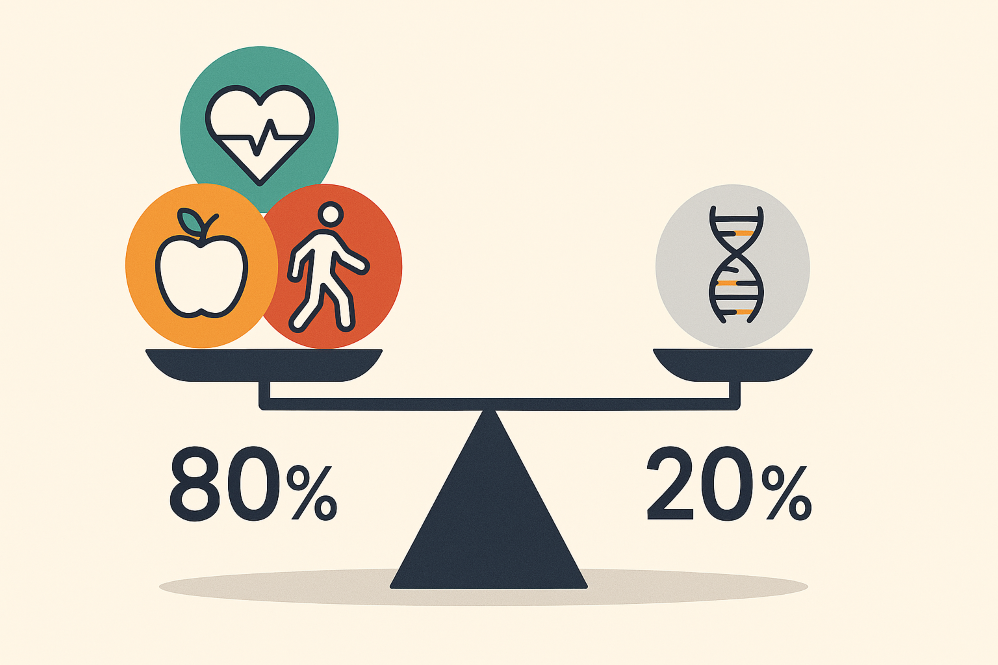A cardiologist recently reminded his audience that more than 80% of chronic disease—heart disease, diabetes, cognitive decline, and even many cancers—stems from lifestyle. Diet, exercise, sleep, and stress management aren’t side notes to medicine. They are medicine.
That number sounds both liberating and intimidating. If so much of our health depends on daily choices, are we to blame when something goes wrong? Not at all. Genes, environment, and plain bad luck fill in the other 20%, and pretending they don’t exist only leads to guilt and burnout.
The 80% Claim: What It Really Means
The idea that lifestyle drives most chronic disease comes from decades of public health research. A 2017 review found that as much as 80% of chronic disease and premature deaths could be prevented through a few fundamental behaviors: not smoking, staying physically active, and eating a balanced diet (NIH / PubMed).
A broader review of lifestyle medicine reached a similar conclusion—our habits, not our genes, explain most of the variance in health outcomes (PMC).
Still, “80%” isn’t a universal constant. It’s a shorthand for the idea that lifestyle holds major influence over chronic disease risk—but not total control. (PMC)
Why Owning the 80% Requires Accepting the 20%
Health is not a moral scoreboard. You can make every “right” choice and still get sick. You can live imperfectly and remain perfectly fine. The point of lifestyle medicine is not to erase risk but to tilt the odds in your favor.
Recognizing the limits of control helps you, drop perfectionism and the guilt that comes with it, recover faster when life throws curveballs, and learn from your mistakes. Owning 80% means taking responsibility for what’s within reach while releasing the pressure to dominate the rest.
What the Evidence Says
Lifestyle habits don’t just make you feel better—they translate into measurable gains in disease-free years.
A massive multicohort study found that people with the healthiest lifestyle patterns—non-smoking, moderate alcohol (no alcohol is better), regular activity, and balanced weight—enjoyed roughly nine to ten extra years without chronic disease compared to those with the poorest habits (JAMA Internal Medicine).
Other research echoes the same theme:
- Exercise reduces risk of cardiovascular disease, diabetes, and certain cancers (PMC).
- Diet quality—especially minimizing ultra-processed foods and emphasizing fiber and plant-based diversity—correlates strongly with reduced inflammation and better longevity (ScienceDirect).
- Sleep may be the silent pillar; poor sleep consistently predicts metabolic dysfunction and cognitive decline (PMC).
And yet, even with perfect adherence, biology and circumstance can still intervene. That’s why we need a philosophy of moderation—not obsession.
A Moderate Framework for Lifelong Health
You don’t need to reinvent your life to reclaim your health. The Moderate Method approach focuses on small, sustainable steps that move you forward without driving you crazy.
Start with one habit. Choose something doable that supports other systems—like walking after meals, cooking one more meal per week, or setting a fixed bedtime. Create a system that cements the habit. Success breeds success.
Then set thresholds, not absolutes. Aim for better, not best. “I’ll get at least 25 minutes of movement five days a week” works better than “I’ll work out every day.”
Experiment in short bursts. Give new routines two weeks and notice changes in energy, mood, and focus. Keep what feels good; drop what feels forced.
And perhaps most importantly—make sure recovery is part of your plan. Without recovery, the rest of your efforts collapse. Rest isn’t retreat; it’s reinforcement.
When the 20% Shows Up
There will be times when the 20% wins: genetics, stress, accidents, age, or simple randomness. The moderate response is not to abandon effort but to pivot focus. Don’t worry about what you can’t control. The past is the past and can’t be changed. Keep moving forward. A setback is not a verdict.
The Takeaway
“Eighty percent lifestyle, twenty percent everything else” isn’t a moral directive. You can’t choose your genes, but you can shape your habits. You can’t prevent every disease, but you can strengthen your foundation.
The moderate path is simple, not extreme: exercise, eat real food, rest well, and don’t beat yourself up when life happens. Don’t create perfection instead create systems you can live with.
Sources and Further Reading

Leave a Reply